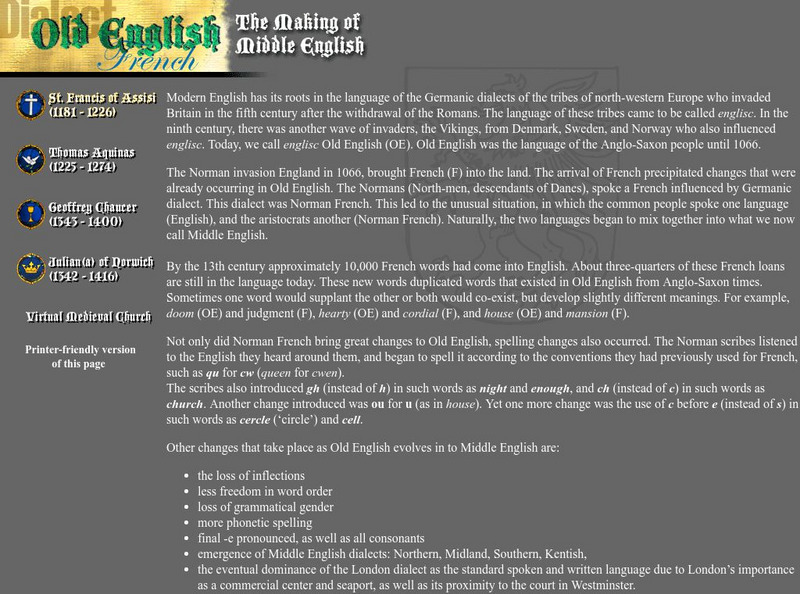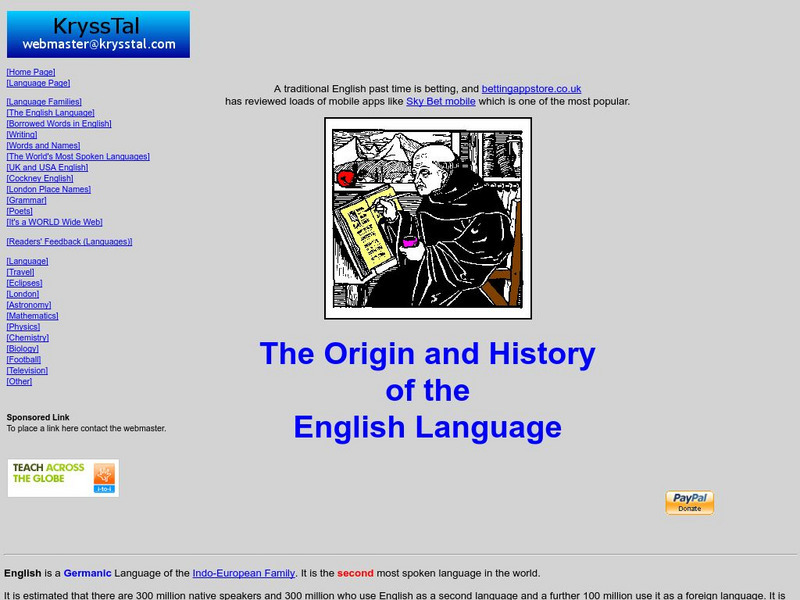Other
Tidewater Community College: Writing Center: Grammar Guidelines
Get a collection of self-help handouts on different parts of speech and common usage topics.
English for Everyone
English for Everyone: Sentence Completion 2: Level 7 [Pdf]
English for Everyone provides a printable quiz to assess Level 7 vocabulary. Students will use context clues to place words, or word pairs, into compound and complex sentences.
English for Everyone
English for Everyone: Sentence Completion 1: Level 8 [Pdf]
English for Everyone provides a printable quiz to assess Level 8 vocabulary. Students will use context clues to place words, or word pairs, into compound, complex, and compound-complex sentences.
English for Everyone
English for Everyone: Sentence Completion 3: Level 8 [Pdf]
English for Everyone provides a printable quiz to assess Level 8 vocabulary. Students will use context clues to place words, or word pairs, into compound, complex, and compound-complex sentences.
English for Everyone
English for Everyone: Sentence Completion 2: Level 9 [Pdf]
English for Everyone provides a printable quiz to assess Level 9 vocabulary. Students will use context clues to place words, or word pairs, into compound, complex, and compound-complex sentences.
English for Everyone
English for Everyone: Sentence Completion 1: Level 10 [Pdf]
English for Everyone provides a printable quiz to assess Level 10 vocabulary. Students will use context clues to place words, or word pairs, into compound, complex, and compound-complex sentences.
English for Everyone
English for Everyone: Sentence Completion 1: Level 11 [Pdf]
English for Everyone provides a printable quiz to assess Level 11 vocabulary. Students will use context clues to place words, or word pairs, into compound, complex, and compound-complex sentences.
English for Everyone
English for Everyone: Sentence Completion 3: Level 11 [Pdf]
English for Everyone provides a printable quiz to assess Level 11 vocabulary. Students will use context clues to place words, or word pairs, into compound, complex, and compound-complex sentences.
Vocabulary.com
Vocabulary.com: Hamlet: Vocabulary From Act I
Foster better understanding of Shakespeare's Hamlet by developing an understanding of the vocabulary he used. You can use the links provided to find vocabulary lists for the remaining four acts as well.
TED Talks
Ted: Ted Ed: Mysteries of Vernacular: Bewilder
The history of the word bewilder is more straightforward than you might think. Roots can be traced back to the Old English words wilde (undomesticated) and deor (untamed animals), eventually combined into the word wilderness. Jessica...
TED Talks
Ted: Ted Ed: A Brief History of Plural Word S
All it takes is a simple S to make most English words plural. But it hasn't always worked that way (and there are, of course, exceptions). John McWhorter looks back to the good old days when English was newly split from German -- and...
TED Talks
Ted: Ted Ed: Mysteries of Vernacular: Inaugurate
From avian omens to the beginning of a new policy or the reign of a new politician, Jessica Oreck follows the flight path of the word inaugurate. [2:08]
Grammarly
Grammarly Handbook: Appropriate Vocabulary
This page focuses on the choice of vocabulary in a paper: Is it clear and appropriate for the audience? Does the vocabulary fit the subject matter? W.11-12.2d Lang/Fig/Voc
Other
Dictionary.com
Dictionary.Com is an online dictionary. It provides definitions, syllabication, pronunciation, word origin, and part of speech. It also provides a word of the day, word games, and much more.
Other
Take Our Word for It
A bi-weekly Webzine of word origins. Includes a Spotlight word, answers to submitted questions, a curmudgeon's corner and other areas.
Other
Word Detective
The Word Detective provides great information on the origin of certain words and phrases that are everyday lingo. Click on Index and chose from the alphabetical list or type the word you are looking for in the search box.
Other
University of St. Thomas: Virtual Medieval Church: The Making of Middle English
Details the changes as a result of a fifth-century invasion in Britain, causing the English and Norman French languages to combine to create what is known as Middle English. Part of William Caxton's prologue to the Eneydos is presented...
Other
The Origin and History of the English Language
How many native English speakers are there in the world today? Learn important facts and statistics about the English-speaking world as well as a history of the language from its Germanic beginnings to the present.
Other
Carson Newman College: A Brief History of English
This site features a brief history of English. Come and check out the links provided within this site. Students and teachers will benefit from this educational resource. It includes time lines.
Other
Business Writing Center: 25 Most Commonly Misspelled Words
A quiz, designed for business writers, that tests knowledge of words which are frequently misspelled. It includes questions about two words which are spelled differently in British spelling than in American spelling.
Other
Etymological Dictionary: Influences on Astronomy
An interesting look at the meanings of many of the words in mythology that have been used in English astronomical field. This resource lists the word, etymological and mythological root or character, and modern English meaning.
Merriam-Webster
Merriam Webster: Visual Dictionary Online
Picture dictionary with 6,000 pictures that illustrate American English words organized around different themes, such as astronomy, clothing, transporation, and sports. With access to a vocabulary-esque game of the week. [Has wraparound...
Bartleby
Bartleby.com: Elementary Rules of Usage
Passage from William Strunk's "Elements of Style" explains how the placement of a participial phrase determines if it refers to the subject of the sentence. Examples.
Bartleby
Bartleby.com: Scholars: Noah Webster
From "Cambridge History of English and American Literature," this site examines Noah Webster's contributions to education as a textbook writer. Lists his major textbooks and describes their popularity.



![English for Everyone: Sentence Completion 2: Level 7 [Pdf] Unknown Type English for Everyone: Sentence Completion 2: Level 7 [Pdf] Unknown Type](https://d15y2dacu3jp90.cloudfront.net/images/attachment_defaults/resource/large/FPO-knovation.png)













